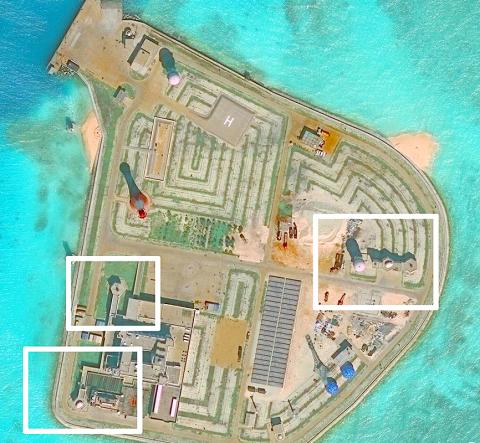China appears to be deploying weapons systems on all seven of the reefs it has reclaimed in the South China Sea, according to photographs released by a Washington-based think tank.
The Asia Maritime Transparency Initiative said it began tracking in June and July the construction of identical hexagon-shaped structures to house the weapons on Fiery Cross Reef (Yongshu Reef, 永暑島), Mischief Reef (Meiji Reef, 美濟礁) and Subi Reef (Jhubi Reef, 渚碧礁), where China has already completed military grade airstrips and installed radar.
“It now seems that these structures are an evolution of point-defense fortifications already constructed at China’s smaller facilities on Gaven [Nansyun, 南薰礁], Hughes [東門礁], Johnson [South] [Chigua Reef, 赤瓜礁] and Cuarteron [Huayang Reef, 華陽礁] reefs,” the unit of the Center for Strategic and International Studies said on its Web site.

Photo: AFP / CSIS Asia Maritime Transparency Initiative / DigitalGlobe
The installations call into question a pledge made by Chinese President Xi Jinping (習近平) not to militarize the disputed islands in the South China Sea, a US$5 trillion-a-year shipping route that the US has patrolled largely unchallenged since World War II.
China’s claims to more than 80 percent of the waters were dismissed by an international tribunal in July. Beijing said it would ignore the ruling.
US president-elect Donald Trump has cited what he said was China’s effort to build a “massive fortress” in the South China Sea as one reason for taking a more confrontational approach to relations.
He listed the project in a Fox News interview, while defending his decision to accept a telephone call from President Tsai Ing-wen (蔡英文), calling into question the US’ “one China” policy.
“I don’t know why we have to be bound by a ‘one China’ policy unless we make a deal with China having to do with other things, including trade,” Trump said in the interview broadcast on Sunday.
The think tank said that anti-aircraft guns appear to have been installed on China’s four smaller reefs. Although they cannot be definitively identified, they were likely to be close-in weapons systems (CIWS) whose function was to detect and destroy incoming missiles and enemy aircraft, the group said.
“These gun and probable CIWS emplacements show that Beijing is serious about defense of its artificial islands in case of an armed contingency in the South China Sea,” it wrote. “Among other things, they would be the last line of defense against cruise missiles launched by the United States or others against these soon-to-be-operational air bases.”

Right-wing political scientist Laura Fernandez on Sunday won Costa Rica’s presidential election by a landslide, after promising to crack down on rising violence linked to the cocaine trade. Fernandez’s nearest rival, economist Alvaro Ramos, conceded defeat as results showed the ruling party far exceeding the threshold of 40 percent needed to avoid a runoff. With 94 percent of polling stations counted, the political heir of outgoing Costa Rican President Rodrigo Chaves had captured 48.3 percent of the vote compared with Ramos’ 33.4 percent, the Supreme Electoral Tribunal said. As soon as the first results were announced, members of Fernandez’s Sovereign People’s Party

EMERGING FIELDS: The Chinese president said that the two countries would explore cooperation in green technology, the digital economy and artificial intelligence Chinese President Xi Jinping (習近平) yesterday called for an “equal and orderly multipolar world” in the face of “unilateral bullying,” in an apparent jab at the US. Xi was speaking during talks in Beijing with Uruguayan President Yamandu Orsi, the first South American leader to visit China since US special forces captured then-Venezuelan president Nicolas Maduro last month — an operation that Beijing condemned as a violation of sovereignty. Orsi follows a slew of leaders to have visited China seeking to boost ties with the world’s second-largest economy to hedge against US President Donald Trump’s increasingly unpredictable administration. “The international situation is fraught

MORE RESPONSIBILITY: Draftees would be expected to fight alongside professional soldiers, likely requiring the transformation of some training brigades into combat units The armed forces are to start incorporating new conscripts into combined arms brigades this year to enhance combat readiness, the Executive Yuan’s latest policy report said. The new policy would affect Taiwanese men entering the military for their compulsory service, which was extended to one year under reforms by then-president Tsai Ing-wen (蔡英文) in 2022. The conscripts would be trained to operate machine guns, uncrewed aerial vehicles, anti-tank guided missile launchers and Stinger air defense systems, the report said, adding that the basic training would be lengthened to eight weeks. After basic training, conscripts would be sorted into infantry battalions that would take

GROWING AMBITIONS: The scale and tempo of the operations show that the Strait has become the core theater for China to expand its security interests, the report said Chinese military aircraft incursions around Taiwan have surged nearly 15-fold over the past five years, according to a report released yesterday by the Democratic Progressive Party’s (DPP) Department of China Affairs. Sorties in the Taiwan Strait were previously irregular, totaling 380 in 2020, but have since evolved into routine operations, the report showed. “This demonstrates that the Taiwan Strait has become both the starting point and testing ground for Beijing’s expansionist ambitions,” it said. Driven by military expansionism, China is systematically pursuing actions aimed at altering the regional “status quo,” the department said, adding that Taiwan represents the most critical link in China’s